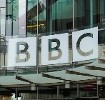Judge us by our quality, says BBC's Tony Hall
It was an upbeat performance by Tony Hall, BBC director general, at an event held by the Future for Public Service Television inquiry.
He was in conversation with Lord Puttnam, the inquiry's leader, in front of an audience at Bafta, Piccadilly, London. He said the BBC had produced a range of successful programmes, such as War and Peace and the Night Manager and he defended the right to make popular formats such as Strictly Come Dancing.
He said the BBC's reputation was based on quality and having the funding to be able to put on such series as Happy Valley, BBC 2's Inside Obama's White House and the work of the Natural History Unit. He said: "I think the best answer to the British public, to the politicians, to the cabinet, to this government, to everyone is the quality of what we do. Judge us by our deeds. And I think at the moment you can see what the BBC can offer."
He refused to be drawn on what was expected in the government's White Paper on the future of the BBC, following on from a Green Paper which threatened to cut the size and scope of the corporation. He said the BBC, funded by the licence fee, had a role in taking risks in programming and nurturing new talent.
"The licence fee should give us the creative freedom to do what other people don't do – I totally reject the PSB model in the States – we must have the freedom to experiment."
He said the other strength the BBC had in an age of social media was the high level of trust it has with the UK public. "In a world where truth is a commodity, the BBC is twice as important," he said.
Martine Croxall, NUJ rep and a BBC News Channel presenter, asked him about the deal he agreed to with the Treasury for the corporation to fund the free TV licences for the over-75s, which could cost more than £700m. He agreed the deal should not have been done the way it had been – over a week, in secret without consultation – saying it wasn't the best decide something so important.
But he defended his decision, saying he had been offered an inflation-linked increase to the licence fee and the end to top-slicing. He said the corporation had been "dumped on" to fund non-broadcasting services, such as the roll out of broadband from the fee. He said he was discussing with Gus O'Donnell, the former cabinet secretary, who has been hired by the corporation to examine how to manage the deal, how the policy can be amended.
He was also asked about BBC Studios, the plan to move programme-making to a wholly-owned subsidiary company which will compete for commissions on the open market, ending in-house production quotas. Sylvia Harvey, visiting professor in communications studies at Leeds University, asked what would happen to intellectual property if BBC Studios were sold off by a future government. Tony Hall said there would be safeguards, but did not give details.
Members of the Federation of Entertainment Unions, which includes the NUJ, and actor Sam West, gave out leaflets, unfurled banners and gave out badges to passers-by and people attending the event. Tony Hall thanked the demonstrators for their support and said it was important that the public had a voice. He also admitted that he already lost his badge – NUJ broadcasting organiser, Sue Harris, was later able to give him another one after the event.
Lord Puttnam said if the independence of the BBC was attacked the public's reaction would make the Countryside Alliance march look like “Mickey Mouse”.


